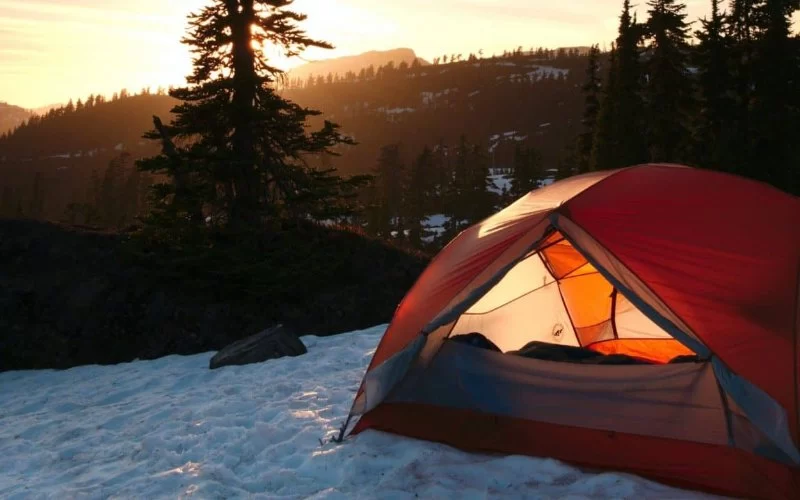Learn how to choose the right backpacking tent for extreme cold weather. Explore key features, real expedition stories, and expert advice. Gear up with help from Pine Cliff Resort.

- choosing-the-right-backpacking-tent-for-extreme-cold-weather
- understanding-the-challenges-of-cold-weather-camping
- features-to-prioritize-in-cold-weather-tents
- real-case-arctic-camping-and-tent-survival
- balancing-weight-and-performance-on-the-trail
- when-to-invest-and-where-to-look
1. Choosing the Right Backpacking Tent for Extreme Cold Weather
Not all tents are built the same—and when you’re facing sub-zero winds, sudden snowstorms, or nights where even your breath freezes on contact, choosing the right backpacking tent for extreme cold weather becomes more than a comfort decision—it’s a matter of survival. Whether you're prepping for an alpine expedition or your first winter trail, this guide breaks down how to select the tent that’ll have your back when nature turns brutal.
2. Understanding the Challenges of Cold Weather Camping
Extreme cold weather camping is an entirely different beast compared to three-season adventures. Wind chills can drop temperatures below freezing, moisture can turn to frost inside your tent, and snow loads can collapse weaker structures. Your tent isn’t just shelter—it’s insulation, windbreak, and safe zone all in one.
2.1 Weather Isn't the Only Threat
High-altitude treks or remote winter trails also pose navigation, wildlife, and condensation issues. A cold-weather tent must handle not just the environment but also the unpredictability of terrain and temperature swings.
2.2 Design Starts with Protection
Double-wall construction, low mesh exposure, and a reinforced frame are essential features in winter-ready tents. Single-wall ultralights may shave weight, but in extreme cold, they often can’t manage moisture and wind effectively. Know what you're up against, and choose accordingly.
3. Features to Prioritize in Cold Weather Tents
When selecting a backpacking tent for winter or extreme cold, certain features should top your checklist. Each one plays a direct role in heat retention, wind resistance, and long-term durability.
3.1 Four-Season Rating
This is non-negotiable. A true four-season tent has stronger poles, a tougher fabric, and a shape that sheds snow efficiently (usually a dome or geodesic style). Look for snow flaps or vestibules that seal in heat while giving space to store snowy gear.
3.2 Wind Resistance and Snow Load Capacity
Aluminum or composite poles in a cross-supported design help maintain structure even under high wind or heavy snow. Stakes and guylines must hold in icy or rocky terrain—always pack extras rated for winter conditions.
3.3 Ventilation Without Losing Warmth
Proper vents near the base and top of the tent prevent internal frost buildup. A tent that traps heat but allows for a steady exchange of air will keep you drier and warmer. Frost on the sleeping bag? That’s often a sign of poor airflow, not temperature.
4. Real Case: Arctic Camping and Tent Survival
On a 14-day snowshoe trek in northern Canada, experienced backpacker Colin Reed credits his life to a properly chosen tent. “We hit -38°C on night six, and winds nearly took out a nearby group’s shelter,” he recalls. “My MSR tent held fast thanks to its triple-pole structure and zero-mesh inner. I didn’t sleep in comfort—but I stayed alive.”
4.1 Lessons from the Field
Colin also emphasized how gear failure in cold weather doesn’t happen slowly. “Things go wrong fast out there. A weak zipper or bent pole can become a serious issue when the wind’s howling at 3AM.” Stories like his highlight why experienced backpackers stress choosing gear that exceeds the minimum specs for your journey.
5. Balancing Weight and Performance on the Trail
Yes, a four-season tent will weigh more than your typical summer setup. But weight isn’t everything. On extreme treks, warmth and structure mean energy saved—not spent fixing gear or shivering through the night.
5.1 Strategic Weight Choices
Some brands now offer hybrid designs with carbon poles or partial mesh panels, ideal for high-altitude yet mobile use. If you're planning an expedition that combines climbing and hiking, choose modular setups where you can reduce weight for summit days while relying on strength in base camp mode.
5.2 Gear Compatibility
Your tent should work in harmony with the rest of your winter gear—sleeping pads with high R-values, mummy-style bags rated for sub-zero, and snow anchors or ice screws. Choosing a tent without thinking about how it integrates with the rest of your system is a rookie mistake.
6. When to Invest and Where to Look
If you’re serious about winter backpacking, don’t cut corners. Entry-level models may look rugged but falter in harsh winds or sub-zero temps. Trusted brands like Hilleberg, Black Diamond, and Mountain Hardwear specialize in expedition-tested cold-weather tents.
6.1 Budget vs. Value
A quality four-season tent may cost more upfront but saves you from costly mid-expedition gear failures—or worse. Consider renting before buying if you’re new to extreme conditions. Some outfitters offer demos, letting you try models in real cold before committing.
6.2 Expert Resources Make the Difference
Still unsure which model suits your adventure? At Pine Cliff Resort, experienced guides and gear experts help match you with gear designed for the exact conditions you're exploring. Whether you’re winter camping in the Rockies or testing your limits in the backwoods, they’ve helped hundreds of backpackers gear up right—and get home safe.
US Forestry Department
410 E Hooper Ave, Soda Springs, ID 83276, USA
Visit Location PageKnowles Overlook Campground
Mack, CO 81525, USA
Visit Location Page